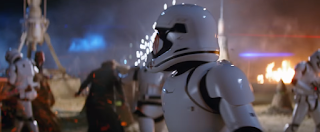Time to wind it down, though. What has this exercise shown?
(And yes, spoilers coming below.)
First off, it's probably still difficult to follow along if you haven't paid attention to this generational stuff before. I'll start to include a pointer back to the introductory chapters:
Hey! If you haven't been here before, I strongly recommend you take a look at the Introduction to Generations, the Generational Attributes and the Four Stories in order to get up to speed on the how this works and the terms being used!
We probably aren't going to find a direct correlation between generational story attributes and box office success. The Hunger Games and Harry Potter are about Heroes growing up, and happen while Heroes are growing up in the real world, and they were successful both as books and films. Star Wars seems to flip it around, though: The Force Awakens is a Prophet story released during a Crisis; the original Star Wars was a Heroic story during an Awakening. If there are correlations to be found, they will have to be more layered than "Heroes like Hero stories, et cetera."
Further, the breakouts used here aren't necessarily the last word in how it can or should be done. There are other aspects of the different periods - such as Awakening's focus on spirituality- that aren't included so far and probably should be. Teamwork seems an important aspect of Hero stories, one that needs additional clarification. Redemption comes in different forms - does Hamlet count? Does Gollum? There's also a need to look at tragedy and how it fits. Some of this could change significantly before we're done.
It may be that the important part will be consistency. Good writers probably keep settings and characters consistent in this way without thinking of it much - unless it's because the do plenty of research to make it so. That The Force Awakens' Prophet story is in an Awakening period with consistent generations may help people connect with it - it makes sense, it could happen this way, it just feels more real.
There's even an exception that proves the rule: Starkiller Base. From a generational view, a massive government-funded military base and super weapon, suddenly showing up 30 years after defeat in a total war, doesn't make a lot of sense. And all sorts of complaints about the movie involve Starkiller Base: It's too much like the Death Star, the attack is too much like A New Hope, destroying multiple planets instantaneously is over-powered even by space-fantasy standards - and hey, what about Skywalker, didn't the opening crawl say that finding him was the main goal here? Change the threat into something that could be built by a defeated and weak enemy, then it makes more sense that a rag-tag Resistance movement could succeed in a last-minute impulsive attack, and tying it more directly into the fate of Luke Skywalker would come more easily. Win-win-win.
(Although the defeat of the First Order's military - which can't all have evacuated - and the destruction of the primary Republic planets (and government) strongly implies that the real point was to kick over chairs, allowing really new directions for the story. Which would be worth seeing. If it happens.)
Finally, this analysis shows that this has not been simply a reboot of the series with new characters. The character arcs may be similar, but they go in different directions. The Force is a complete mystery to Luke, a legend to Rey and Finn. The attack on Starkiller Base is a side effect of the plot, while the Death Star attack is the core of A New Hope. Their are echoes, and similarities, and perhaps too much that is too alike, but it's a different sort of story unfolding here. And that's good.
There's even an exception that proves the rule: Starkiller Base. From a generational view, a massive government-funded military base and super weapon, suddenly showing up 30 years after defeat in a total war, doesn't make a lot of sense. And all sorts of complaints about the movie involve Starkiller Base: It's too much like the Death Star, the attack is too much like A New Hope, destroying multiple planets instantaneously is over-powered even by space-fantasy standards - and hey, what about Skywalker, didn't the opening crawl say that finding him was the main goal here? Change the threat into something that could be built by a defeated and weak enemy, then it makes more sense that a rag-tag Resistance movement could succeed in a last-minute impulsive attack, and tying it more directly into the fate of Luke Skywalker would come more easily. Win-win-win.
(Although the defeat of the First Order's military - which can't all have evacuated - and the destruction of the primary Republic planets (and government) strongly implies that the real point was to kick over chairs, allowing really new directions for the story. Which would be worth seeing. If it happens.)
Finally, this analysis shows that this has not been simply a reboot of the series with new characters. The character arcs may be similar, but they go in different directions. The Force is a complete mystery to Luke, a legend to Rey and Finn. The attack on Starkiller Base is a side effect of the plot, while the Death Star attack is the core of A New Hope. Their are echoes, and similarities, and perhaps too much that is too alike, but it's a different sort of story unfolding here. And that's good.




